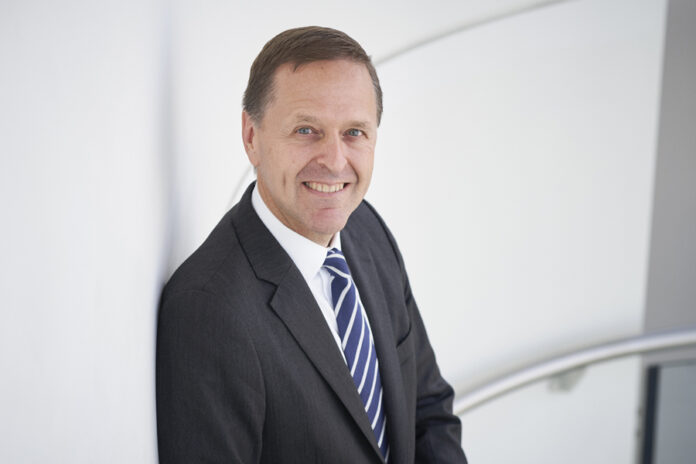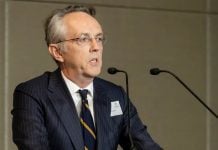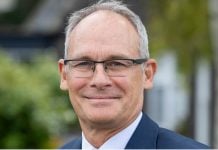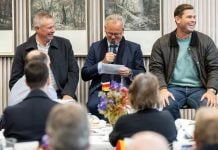Paul Schreier (OM 1986) began his time at Melbourne Grammar as an entrance scholar. Today, he is Chief Operating Officer (COO) of the Wellcome Trust—the biggest medical scientific charity in the world—and since early this year has found himself working directly on responses to COVID-19, notably on treatments.
Paul’s life path is a testament to the transformative effects of education, along with the benefits of following one’s passions and interests to find the next opportunity.
“My father was a steelworker and my mother a seamstress, so that day in 1979 when I won a scholarship to enter Wadhurst was completely life-changing,” Paul remembers.
“Melbourne Grammar set me up, in so many ways, for life. There’s little doubt in my mind that it’s one of the great schools.”
As a student, Paul balanced his enjoyment of academic challenges with achievements in rowing and rugby, culminating as Captain of School. Further study in Australia would have been the most obvious next step, but Paul had a desire to see more of the world. At this point he turned to his mentor, then-Headmaster Nigel Creese, for advice.
“Even though Nigel Creese was an Oxford man, he suggested I look into studying at Cambridge because it had a broader sweep of science subjects, which was where my interests then laid,” Paul explains. There, he completed undergraduate and master’s degrees followed by a PhD in engineering. He also led various student clubs and societies.
“I’m a bit inclined to roll the dice if I feel something might be interesting, so I joined the Royal Naval Reserve on a whim while still a student at Cambridge,” Paul adds. “I was only intending to do it as a hobby, but after I went to sea, I thought it could actually be an interesting career. In the RNR I was a junior rating, so for those who might have read any Patrick O’Brian, I was promoted from before the mast to become an officer in my later full-time service.”
Paul was a Warfare Officer in the Royal Navy for seven years, serving worldwide, including on operations in Northern Ireland, Kosovo and Bosnia. Following this Paul joined the commercial world, working for McKinsey in the UK, Europe, Middle East, Africa and Asia. Then, after 23 years abroad, he returned to Australia where he became Deputy Secretary, Economic and Strategy in the Department of the Prime Minister and Cabinet. Paul was subsequently appointed to the role of Deputy Vice-Chancellor at Macquarie University in 2013. In 2016, he returned to the UK as chief executive at Hakluyt & Company, before taking up his role as COO of the Wellcome Trust last year.
Of course, in taking on this new position, Paul could not have known that within a few short months he would be part of an effort to respond to a global pandemic. Speaking with a group of Old Melburnians via webinar in July 2020, Paul shared his thoughts on the COVID-19 research completed so far, emphasising the importance of treatments and testing alongside the hunt for effective vaccines.
“In terms of a vaccine, it probably won’t be a ‘winner takes all’ scenario—we may well need different vaccines for different populations and it is quite possible that a vaccine won’t work for all or, indeed, any. That said, we are observing progress on vaccines with growing confidence,” he explained. “In addition, we’re getting better at dealing with COVID-19 every day in the absence of a vaccine. We’re also learning a huge amount that’s applicable to other viruses and diseases that will generate decades of research in years to come.”
“This is the biggest vaccine and treatment research and development effort in human history by several orders of magnitude,” Paul added. “We’re throwing the kitchen sink at this one – unsurprisingly, given the enormous economic, social and health impacts worldwide.”
“Beyond this, the COVID-19 Vaccines Global Access (COVAX) Facility is a very important, and welcome, multilateral response to the pandemic,” says Paul. The COVAX Facility is a global risk-sharing mechanism for pooled procurement and equitable distribution of eventual COVID-19 vaccines. “Australia is part of COVAX, of course, as are other high-income countries, alongside many low- and middle-income countries whose needs will exceed their resources,” explains Paul. “The Facility aims to develop and distribute two billion vaccine doses by the end of 2021.”



